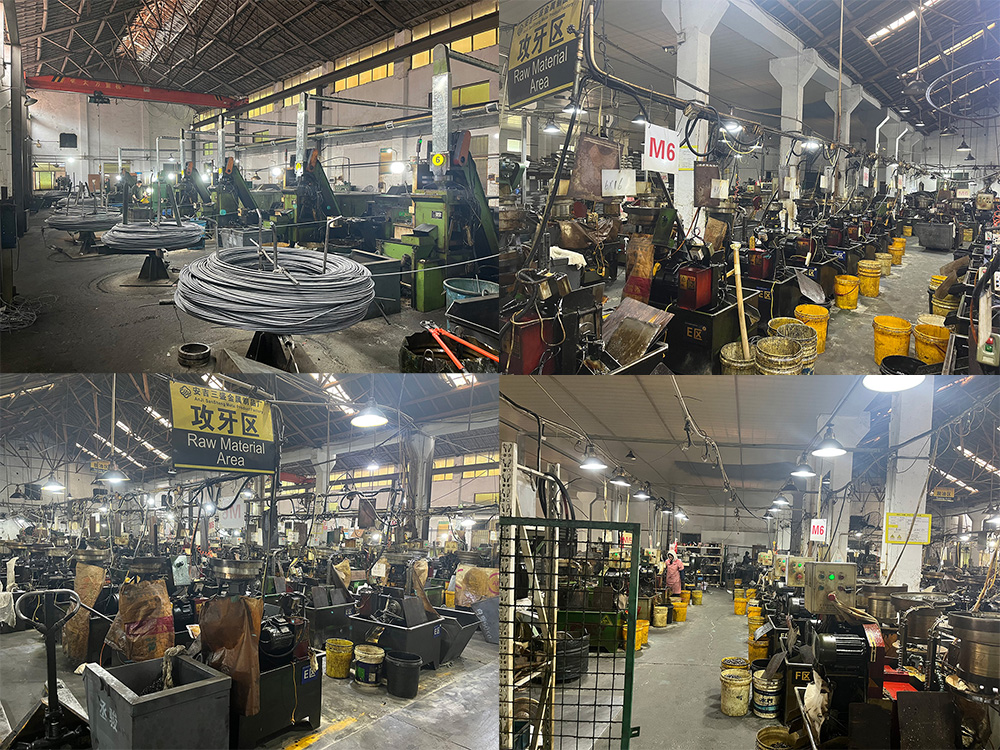What Is the Difference Between Self-Tapping Screws and Regular Screws
In modern manufacturing and assembly industries, self-tapping screws are widely used for their efficiency and versatility.
A self-tapping screw is a type of threaded fastener capable of forming its own mating thread in metal or non-metal materials without the need for pre-tapping or a nut.
Compared with regular screws, self-tapping screws greatly improve production efficiency and simplify the assembly process, making them ideal for use in household appliances, sheet metal parts, electronics, and automotive components.

Key Differences Between Self-Tapping Screws and Regular Screws
Although both are common fastening elements, self-tapping screws and regular screws differ significantly in structure, installation method, and function.
- Structural Difference:
A self-tapping screw usually has a sharp or drill-like tip, allowing it to penetrate and cut threads directly into the material. Regular screws, by contrast, typically have flat or round tips and require pre-drilled holes or nuts to fasten properly. - Installation Method:
Self-tapping screws can be inserted directly into the material without a nut, while regular screws must be paired with a nut or pre-threaded hole. - Functional Mechanism:
A self-tapping screw creates an internal thread (female thread) during installation, whereas a regular screw only provides the external (male) thread. - Ease of Operation:
Self-tapping screws are faster and easier to install, reducing both time and labor costs — an advantage in automated assembly lines.
Types and Head Designs of Self-Tapping Screws
To meet diverse application needs, self-tapping screws come in a variety of head shapes and materials. Choosing the correct combination enhances fastening strength and appearance.
Common Head Types:
- Pan Head: Suitable for general metal or plastic structures.
- Flat Head: Ideal for flush installation, providing a smooth surface appearance.
- Oval and Countersunk Head: Used in applications where the screw head needs to be hidden.
Material Options:
- Carbon Steel (1022 Medium Carbon Steel): High strength and excellent cost performance.
- Stainless Steel (304 & 316): Outstanding corrosion and rust resistance, suitable for humid or outdoor environments.
Common Types and Applications of Self-Tapping Screws
Depending on their thread design and purpose, self-tapping screws can be classified into several major categories:
- Plastic Self-Tapping Screws:
Designed with deeper threads and a larger pitch, ideal for plastic assemblies. They cannot be used with nuts due to thread spacing differences. - Sheet Metal Self-Tapping Screws:
Features a triangular thread form, widely used for thin metal sheet connections. Some models can also fit nuts based on JIS standards. - Thread-Forming Screws (Extrusion Type):
Form threads by displacing material rather than cutting it, suitable for soft metals or plastics, providing smoother installation and higher resistance to loosening.
In practice, self-tapping screws are indispensable in sheet metal structures, electrical appliances, lighting fixtures, and machinery parts.
Core Features and Advantages of Self-Tapping Screws
Self-tapping screws offer several distinct advantages that make them one of the most widely adopted fasteners in industrial and consumer products:
- No need for nuts or pre-tapped holes — direct drilling and fastening.
- Time-saving and labor-efficient, ideal for automated production lines.
- Reliable connection strength, with excellent vibration and loosening resistance.
- Wide adaptability across materials such as metal, plastic, and wood.
These characteristics make them a preferred choice in industries requiring high efficiency and precision fastening.
Advantages of Xinchi Fasteners Factory in Manufacturing Self-Tapping Screws
As a professional self-tapping screw manufacturer, Xinchi Fasteners Co., Ltd. has accumulated years of production experience and technical expertise.
Our factory provides comprehensive manufacturing capabilities and quality assurance to meet diverse customer needs.
- Premium Raw Materials:
We select high-grade carbon steel and stainless steel to ensure mechanical strength, durability, and corrosion resistance. - Advanced Production Equipment:
Utilizing multi-station cold heading machines and automatic thread rolling systems to achieve high precision and consistent thread quality. - Strict Quality Control:
Each production batch undergoes torque testing, hardness inspection, and salt spray testing in compliance with international standards. - Customized Solutions (OEM & ODM):
Xinchi offers full customization based on drawings or samples, including various surface treatments such as zinc plating, nickel plating, and Dacromet coating. - Global Supply Network and On-Time Delivery:
Our products are exported worldwide — to Europe, America, and Southeast Asia — supported by efficient logistics and stable delivery schedules.
In summary, the key difference between self-tapping screws and regular screws lies in their ability to form threads independently during installation.
Self-tapping screws reduce assembly complexity, improve efficiency, and deliver reliable fastening performance — making them a critical component in modern industry.
With its advanced technology, strict quality standards, and flexible customization, Xinchi Fasteners continues to provide high-performance self-tapping screws and comprehensive fastening solutions to global customers.

Xinchi is a trustworthy fastener company, especially in furniture nuts. We have a factory that was founded in 2007. We are the designated fastener supplier to“STAPLE”. As a trusted fastener supplier, XINCHI offers a wide range of high-quality fasteners, including nuts, screws, bolts, rivets, and washers. Our products are widely used in automotive, machinery, construction, electronics, and furniture industries, trusted by global customers for stability, precision, and durability.

